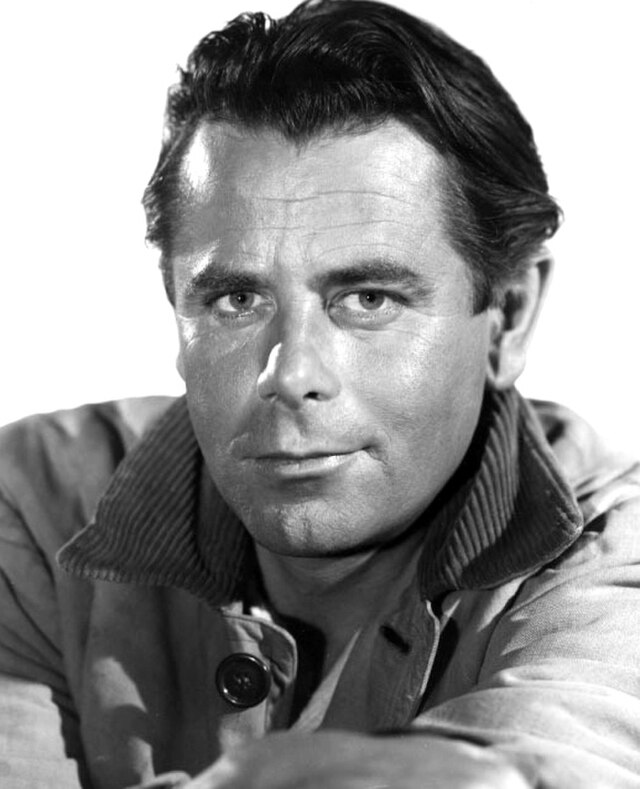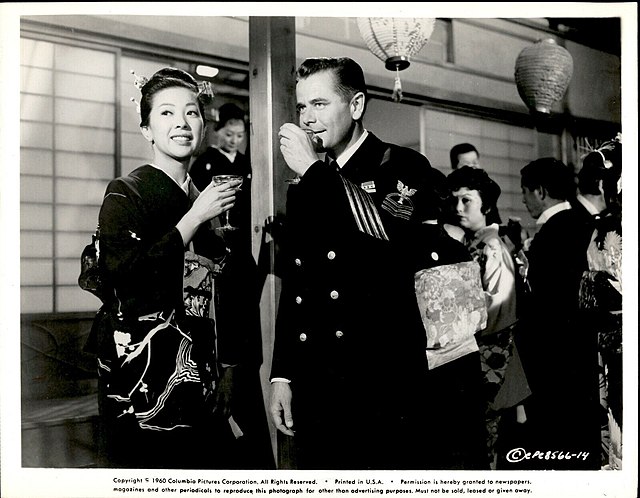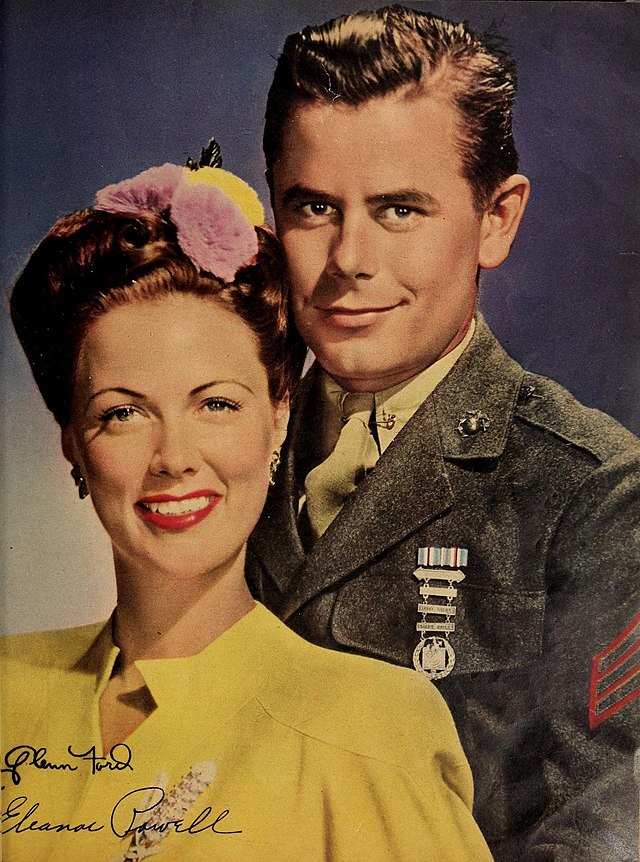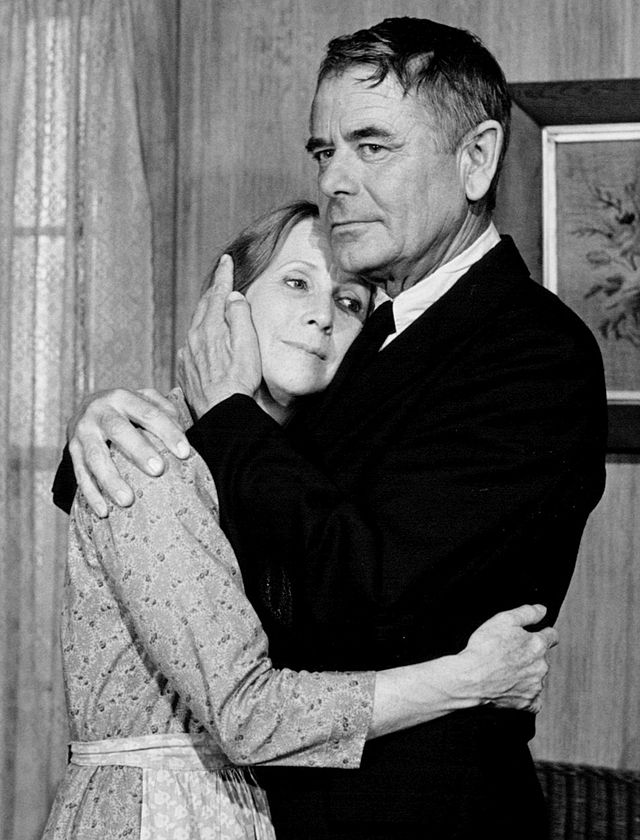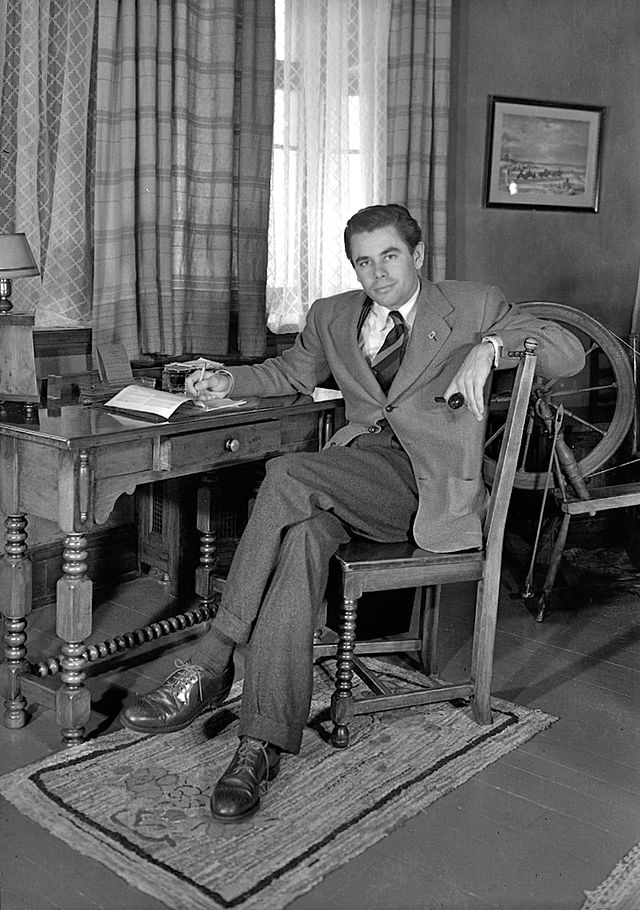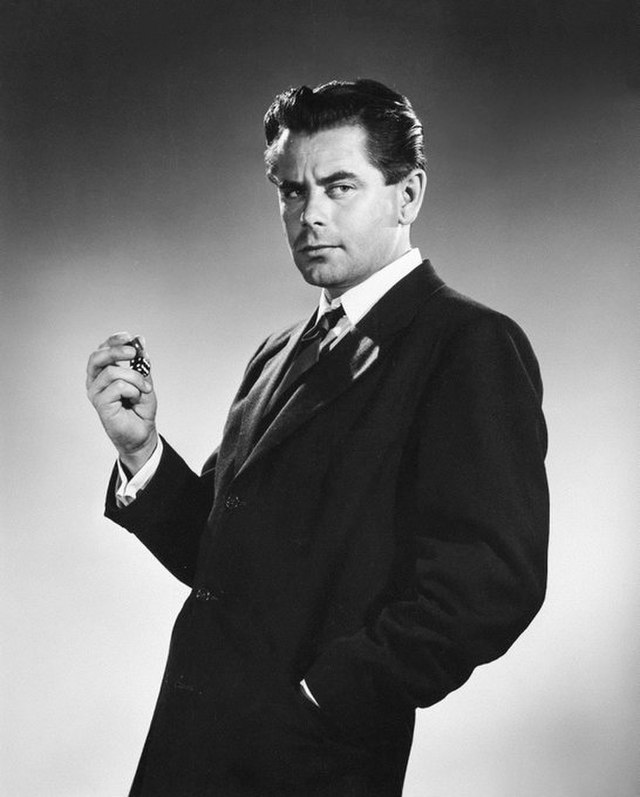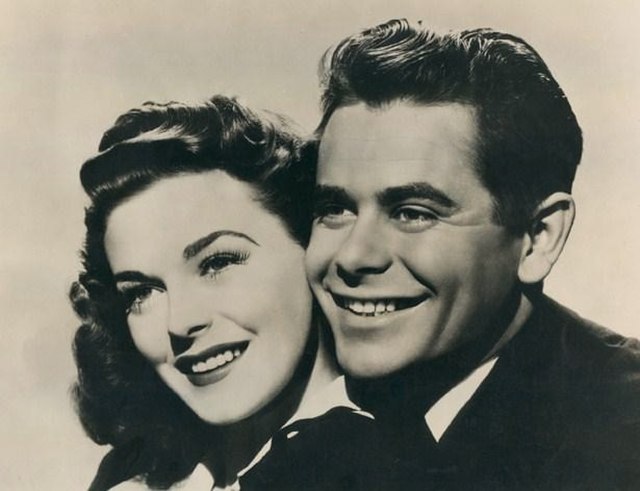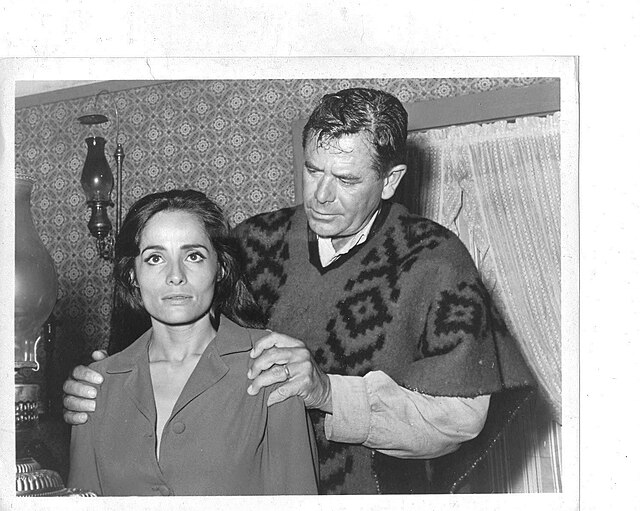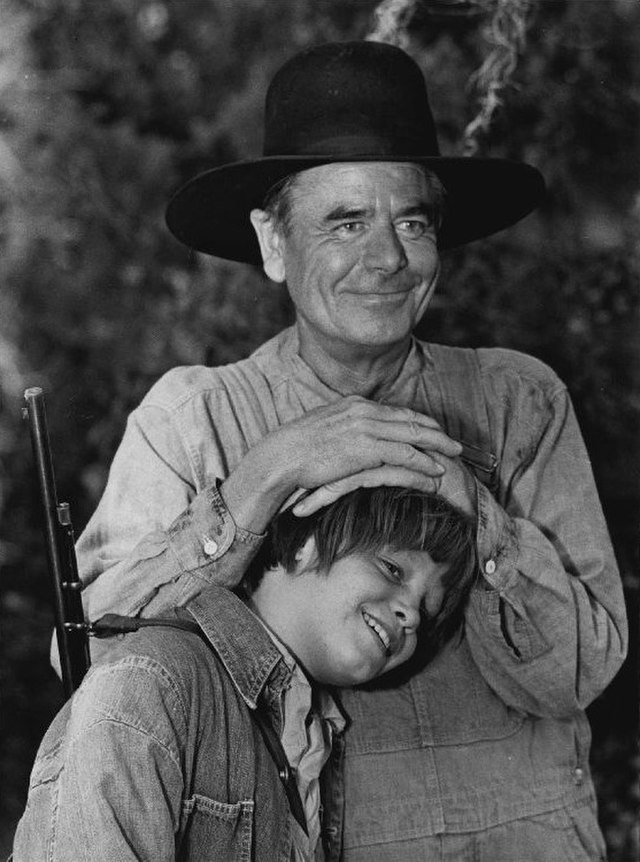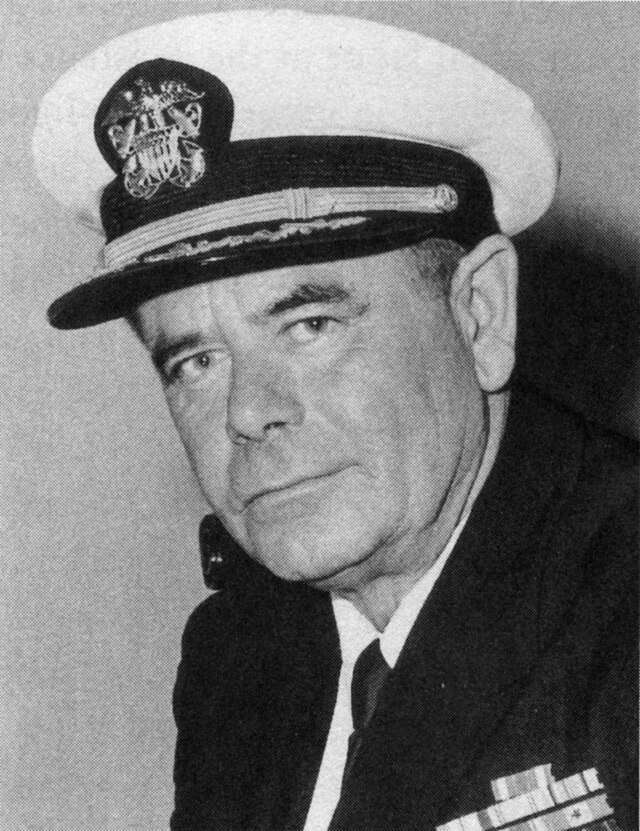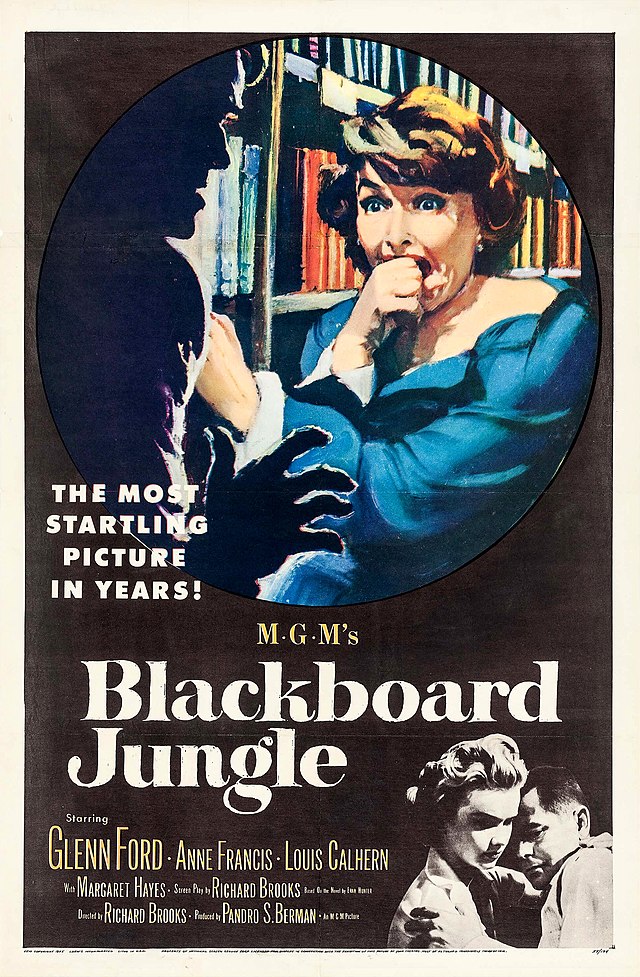Glenn Ford
back| Full Name | Gwyllyn Samuel Newton Ford |
| Stage Name | Glenn Ford |
| Born | May 1, 1916 |
| Birthplace | Sainte-Christine-d'Auvergne, Quebec, Canada |
| Died | August 30, 2006 |
| Buried | Cremated; ashes scattered at sea |
| Married to | Eleanor Powell (m. 1943–1959, divorced) - Kathryn Hays (m. 1966–1969, divorced) - Cynthia Hayward (m. 1977–1984, divorced) - Jeanne Baus (m. 1993–1994, divorced) |
| Children | Peter Ford (with Eleanor Powell) |
| Notable films | Gilda (1946) - The Big Heat (1953) - Blackboard Jungle (1955) - 3:10 to Yuma (1957) - Superman (1978) - Cimarron (1960) - The Fastest Gun Alive (1956) |
Glenn Ford
King of Cool
Glenn Ford (1916–2006) was a Canadian-American actor renowned for his versatility and naturalistic acting style. His breakout role came in the film noir classic "Gilda" (1946) alongside Rita Hayworth, establishing him as a leading man.
Ford excelled in a variety of genres, including Westerns ("3:10 to Yuma", "The Fastest Gun Alive") and dramas ("Blackboard Jungle"). Over his six-decade career, Ford appeared in more than 100 films. He won a Golden Globe for "Pocketful of Miracles" (1961) and received the French Legion of Honour for his World War II service.
Related
Glenn Ford (1916 – 2006)
Biography and Movie Career
Glenn Ford, born Gwyllyn Samuel Newton Ford on May 1, 1916, in Sainte-Christine-d'Auvergne, Quebec, Canada, was the son of Hannah Wood Mitchell and Newton Ford, a railway executive. His lineage included English and Scottish roots, which influenced his reserved and stoic persona. In 1922, at the age of six, Ford's family moved to the United States, settling in Santa Monica, California. This relocation marked the beginning of a lifelong connection to Hollywood, as Santa Monica would eventually serve as a gateway to Ford’s acting career.
Growing up in the shadow of Hollywood, Ford developed an early interest in the arts, particularly acting. He attended Santa Monica High School, where he was actively involved in school plays and drama. His passion for performance was encouraged by his parents, who supported his aspirations. After high school, Ford joined a traveling theater company and honed his acting skills on the stage. His commitment to his craft caught the attention of Hollywood talent scouts, leading him to screen tests and eventually to his first film role.
Path Towards Success
Glenn Ford's film debut came in 1939 with "Heaven with a Barbed Wire Fence," a modest start that showcased his potential as a leading man. Over the next few years, Ford appeared in a series of B-movies and gained experience in a variety of roles. His career trajectory, however, was interrupted by World War II. Ford enlisted in the United States Marine Corps in 1942, driven by a sense of duty and patriotism. During the war, he served as a photographic specialist and rose to the rank of sergeant. His military service further developed his discipline and work ethic, qualities that would become hallmarks of his acting career.
After the war, Ford returned to Hollywood, more determined than ever to succeed. He quickly found work, thanks in part to his reputation as a reliable and professional actor. His big break came in 1946 when he starred alongside Rita Hayworth in the film noir classic "Gilda." Directed by Charles Vidor, "Gilda" was a box office hit and established Ford as a major star. His portrayal of Johnny Farrell, a morally ambiguous character caught in a web of deceit and passion, resonated with audiences and critics alike. The on-screen chemistry between Ford and Hayworth was electric, and their collaboration would continue in several more films.
Rising Star and Notable Works
Throughout the late 1940s and 1950s, Glenn Ford's star continued to rise. He became known for his versatility, able to transition seamlessly between film noir, westerns, dramas, and comedies. His performances were marked by a naturalistic style and an ability to convey complex emotions with subtlety. Ford's everyman appeal made him relatable, and his characters often embodied the struggles and aspirations of ordinary people.
Some of Ford's most notable films during this period include:
- "The Big Heat" (1953): Directed by Fritz Lang, this hard-hitting film noir featured Ford as a relentless detective seeking justice after his wife is murdered. The film's gritty realism and Ford's powerful performance solidified his status as a leading man in the genre.
- "Blackboard Jungle" (1955): In this groundbreaking drama, Ford played Richard Dadier, a dedicated teacher trying to reach troubled students in an inner-city school. The film was both a critical and commercial success, addressing social issues and featuring Bill Haley's "Rock Around the Clock," which became an anthem for the emerging rock and roll generation.
- "3:10 to Yuma" (1957): Ford's portrayal of the charismatic outlaw Ben Wade in this classic western demonstrated his ability to play both hero and anti-hero roles. The film's tense narrative and Ford's nuanced performance earned him critical acclaim.
- "The Fastest Gun Alive" (1956), "The Sheepman" (1958), and "The Rounders" (1965): These films showcased Ford's talent in westerns, a genre he became closely associated with throughout his career.
- "The Courtship of Eddie's Father" (1963): Ford's performance as a widowed father balancing the demands of his career and raising his son struck a chord with audiences. The film's success led to a popular television series of the same name.
Personal Life and Marriages
Ford's personal life was as eventful as his career. In 1943, he married the famous tap dancer and actress Eleanor Powell. The couple had one son, Peter Ford, born in 1945. Ford and Powell's marriage was one of Hollywood's high-profile unions, but it was also marked by challenges. Ford's demanding career and frequent absences put a strain on their relationship. They divorced in 1959 after 16 years of marriage.
Ford would marry three more times, each marriage ending in divorce. His second wife was actress Kathryn Hays, whom he married in 1966. Their marriage was short-lived, ending in 1969. In 1977, Ford married Cynthia Hayward, a marriage that lasted until 1984. His fourth and final marriage was to Jeanne Baus in 1993, but they divorced a year later in 1994.
Ford's relationships with women were often complicated, and he was known for his numerous affairs, some of which involved his co-stars. Despite his tumultuous personal life, Ford remained a devoted father to his son, Peter, and maintained a close relationship with him throughout his life.
Passions and Interests
Beyond acting, Glenn Ford had a wide range of interests. He was an avid pilot and owned several aircraft throughout his life. Flying was one of his great passions, and he often spoke of the freedom he felt while in the air. Ford was also an accomplished horseman, a skill that served him well in his many western films. His love for horses extended beyond the screen, and he owned a ranch in Oregon where he could indulge his passion for riding and ranching.
Ford was known for his generosity and commitment to charitable causes. He was involved in various philanthropic activities, including supporting veterans' organizations and children's charities. His military service left a lasting impact on him, and he remained dedicated to supporting his fellow veterans throughout his life.
Later Years and Legacy
As Ford aged, his film appearances became less frequent, but he continued to work in television and occasional film projects. In 1978, he appeared in a memorable supporting role as Jonathan Kent, Superman's adoptive father, in the blockbuster film "Superman." This role introduced Ford to a new generation of fans and showcased his enduring appeal.
Ford's contributions to cinema were recognized with numerous awards and honors. He received a Golden Globe Award for Best Actor in a Comedy or Musical for his role in "Pocketful of Miracles" (1961) and was honored with a star on the Hollywood Walk of Fame. In 1992, Ford was awarded the French Legion of Honour for his service during World War II.
Death and Cause of Death
Glenn Ford passed away on August 30, 2006, at the age of 90, in his Beverly Hills home. The cause of death was reported as natural causes. Ford had been in declining health for several years, suffering from heart problems and a series of minor strokes. Despite his health issues, he remained mentally sharp and engaged with the world around him until the end.
Ford's death marked the end of an era, as he was one of the last surviving stars from Hollywood's Golden Age. His legacy as an actor is preserved in his extensive body of work, which continues to be celebrated by film enthusiasts and scholars. Glenn Ford's ability to convey strength, vulnerability, and authenticity made him one of the most respected and enduring actors of his generation. His contributions to film, his dedication to his craft, and his service to his country have ensured his place in the annals of Hollywood history.
Glenn Ford Documentary:
Analysis of Glenn Ford’s Acting Style:
Glenn Ford's acting style was distinctive and influential, characterized by his naturalistic approach, emotional depth, and versatility across a wide range of genres. His ability to portray complex characters with subtlety and realism made him one of the most respected actors of his time. Here's a detailed analysis of his acting style:
Naturalism and Subtlety
Glenn Ford was known for his naturalistic acting style, which set him apart from many of his contemporaries. While the Golden Age of Hollywood was often characterized by more theatrical and larger-than-life performances, Ford's approach was understated and realistic. He had a talent for conveying emotion with minimalistic gestures and facial expressions, which made his performances feel genuine and relatable. This naturalism allowed audiences to connect with his characters on a personal level, as they appeared to be real people rather than exaggerated archetypes.
For example, in the film "Blackboard Jungle" (1955), Ford's portrayal of Richard Dadier, a teacher in a rough inner-city school, is grounded and sincere. He doesn't resort to melodramatic displays; instead, he uses a quiet intensity to convey his character's frustration, fear, and determination. This approach not only made the character more believable but also brought a sense of authenticity to the film's portrayal of social issues.
Versatility Across Genres
One of Glenn Ford's greatest strengths was his versatility. Throughout his career, he successfully navigated a variety of genres, including film noir, Westerns, dramas, comedies, and thrillers. His ability to adapt to different roles and settings showcased his range as an actor.
- Film Noir: In films like "Gilda" (1946) and "The Big Heat" (1953), Ford excelled at playing morally ambiguous characters. His performances in these films were marked by a cool, understated demeanor that belied the inner turmoil of his characters. In "Gilda," his portrayal of Johnny Farrell is a masterclass in controlled tension. Ford's subtle glances and measured speech convey his character's conflicted emotions, making him both sympathetic and enigmatic.
- Westerns: Ford's naturalism translated well to Westerns, a genre that often demands a grounded, rugged presence. In movies like "3:10 to Yuma" (1957) and "The Fastest Gun Alive" (1956), Ford played characters who were tough yet vulnerable, embodying the stoic hero archetype with a touch of sensitivity. His ability to convey a sense of quiet strength and moral complexity made his Western characters more nuanced and relatable.
- Comedies and Dramas: Ford also demonstrated a flair for comedy and lighthearted drama. In films like "The Courtship of Eddie's Father" (1963) and "The Gazebo" (1959), he displayed a charming, affable side, bringing warmth and humor to his roles. His comedic timing was impeccable, and his ability to switch between dramatic and comedic tones added depth to his performances.
Emotional Depth and Relatability
Glenn Ford had a remarkable ability to portray the internal struggles of his characters. His performances often carried an undercurrent of vulnerability, which made even his toughest characters relatable. Ford's eyes and facial expressions were particularly expressive, allowing him to communicate complex emotions without needing to rely on dialogue. This ability to convey emotional depth made his characters feel layered and human.
In "3:10 to Yuma," Ford's character, Ben Wade, is a charismatic outlaw who reveals unexpected dimensions of compassion and introspection. Ford plays Wade with a subtlety that invites the audience to see beyond his outlaw exterior, hinting at the character's inner conflict and the reasons behind his choices. This depth is what made Ford's performances compelling; he never portrayed his characters as one-dimensional, always suggesting a backstory and internal life that added richness to the narrative.
Understated Charisma
Ford possessed a unique, understated charisma that made him a magnetic screen presence. He wasn't flamboyant or showy, yet he commanded attention whenever he appeared on screen. His calm, composed demeanor often contrasted with the intensity of the situations his characters faced, creating a compelling tension. This quiet strength made Ford a powerful leading man, capable of carrying a film without overshadowing his co-stars.
This charisma is evident in "Gilda," where his character's restrained intensity plays off the flamboyance of Rita Hayworth's Gilda. The dynamic between the two creates a palpable chemistry that drives the film. Ford's ability to hold his own alongside such a strong presence speaks to his skill as an actor and his ability to captivate audiences with a less-is-more approach.
Authenticity and Professionalism
Ford's reputation for professionalism and his commitment to his craft were reflected in his performances. He approached each role with seriousness and dedication, which translated into authentic portrayals that resonated with audiences. He was known for his meticulous preparation and his willingness to collaborate with directors and co-stars to achieve the best possible performance.
His authenticity was not just in his performances but also in how he conducted himself off-screen. Ford's genuine nature and lack of pretense endeared him to colleagues and audiences alike. He was seen as a true professional who brought integrity and sincerity to his work, qualities that are evident in the authenticity of his on-screen presence.
Glenn Ford's acting style was defined by its naturalism, emotional depth, and versatility. His ability to bring authenticity to a wide range of characters made him one of the most respected actors of his time. Whether playing a conflicted noir anti-hero, a stoic Western cowboy, a caring father, or a comedic lead, Ford's performances were marked by a quiet power and relatability that resonated with audiences. His legacy as a Hollywood icon endures, and his films continue to be celebrated for their compelling portrayal of human experience, brought to life by Ford's exceptional talent and subtle artistry.
Personal Quotes:
On Acting and His Career:
- “An actor should always let humility outweigh ambition.”
This quote reflects Ford's grounded approach to his craft and the importance he placed on humility in an industry often driven by ambition and ego. His modesty and professionalism were well-respected throughout his career.
- “You do what you have to do in life, when you form a philosophy that you can. I didn't have a plan; I just wanted to be happy and have a nice family.”
Ford often spoke about the importance of happiness and family over fame or fortune. This quote highlights his down-to-earth perspective and the simple values that guided his life.
- “It really doesn't matter whether you play a hero or a villain. When you start acting, you just want to be noticed.”
This quote shows Ford’s understanding of the acting profession, emphasizing the universal desire among actors to make a mark and be recognized for their work, regardless of the type of roles they play.
- “I think the director is the captain of the ship. He can tell you what he wants and if he knows what he's doing, he'll get it.”
Ford's respect for directors and their vision is evident in this quote. He recognized the collaborative nature of filmmaking and the importance of trusting a director's guidance to bring a story to life.
- “You get to know a character by getting inside him. I know the way he walks, and then I begin to see the world through his eyes, and gradually, he becomes part of me.”
This quote illustrates Ford’s method of immersing himself in his roles. His ability to inhabit his characters so completely is a testament to his skill as an actor and his dedication to his craft.
On Hollywood and the Film Industry:
- “I was never a Hollywood glamour boy. I was always a character actor who was lucky enough to play leading roles. I like to think I always played characters.”
Ford acknowledged his place in Hollywood not as a conventional leading man but as a versatile character actor. His career was defined by the depth and complexity he brought to his roles, rather than relying solely on star power.
- “Hollywood is like an empty wastebasket. You put something in, you pull something out. You take your chances, you’re either successful or you’re not.”
This quote reflects Ford’s pragmatic view of Hollywood. He understood the industry’s unpredictability and the role of chance in an actor’s career success, highlighting his realistic outlook on the business.
- “When I started, acting was like going to college. Every part I played was like a course I had to study. And when it was over, I got a diploma. I never went to college, but I've always said that I took a doctorate in acting.”
Ford compared his acting career to a lifelong education. Each role was a learning experience that added to his understanding of the craft, emphasizing his commitment to continually growing as an actor.
On Life and Personal Reflections:
- “Do your best and do it well. You can’t control what people think of you or your work, but you can control how much effort you put into it.”
This quote highlights Ford’s belief in dedication and hard work. He understood that while external opinions are beyond one’s control, the effort and commitment one puts into their work are what truly matter.
- “I’ve never played anyone but myself on screen. Just different parts of myself.”
Ford's introspective comment suggests that acting, for him, was about exploring different facets of his own personality and experiences, rather than completely transforming into someone else. It underscores his approach to bringing authenticity to his roles.
- “You take life as it comes. That’s what you do. You take it and you live it.”
Ford's philosophy of accepting life’s challenges and living fully reflects his practical and resilient nature. This attitude likely contributed to his ability to maintain a long and successful career in the often turbulent world of Hollywood.
On Legacy and Career Reflections:
- “If I could choose any career in the world, it would be the same. I wouldn’t change a thing.”
Ford’s satisfaction with his career and the choices he made is evident in this quote. It shows his contentment with the path he took and the fulfillment he found in his work as an actor.
- “I’ve had a very happy life, and I’m very grateful for it.”
A reflection of his overall outlook on life, this quote shows Ford’s gratitude for his experiences and the positive perspective he maintained throughout his life.
How Tall was Glenn Ford?
Glenn Ford was approximately 5 feet 11 inches (180 cm) tall. His height, along with his lean and athletic build, contributed to his strong screen presence and ability to play a wide range of characters, from tough cowboys in Westerns to suave leading men in dramas and film noir.
The Glenn Ford Mansion
lenn Ford's mansion, often referred to as the Glenn Ford Estate, was located in Beverly Hills, California, one of the most prestigious neighborhoods in Los Angeles. The estate was known for its classic Hollywood glamour, reflecting the lifestyle of a major film star during Hollywood's Golden Age. Here’s an overview of the notable aspects of Glenn Ford's mansion:
Location and Overview
- Address: The mansion was situated in the upscale Trousdale Estates area of Beverly Hills, known for its luxurious homes and stunning views of Los Angeles. The address of the estate was 1400 Tower Grove Drive, Beverly Hills, California.
- Neighborhood: Trousdale Estates was home to many Hollywood celebrities and influential figures. The neighborhood is characterized by its mid-century modern architecture and sweeping city views.
Architectural Style and Features
- Mid-Century Modern Design: Glenn Ford’s mansion was designed in a mid-century modern style, which was popular among Hollywood elites during the 1950s and 1960s. This architectural style emphasized clean lines, open floor plans, and integration with the natural surroundings.
- Sprawling Grounds: The estate featured expansive grounds with beautifully landscaped gardens, which provided privacy and a serene environment. The gardens often included lush greenery, pathways, and outdoor entertaining spaces.
- Luxury Amenities: The mansion was equipped with high-end amenities typical of Hollywood homes of that era. It likely included a large swimming pool, a spacious patio area for hosting gatherings, and possibly a tennis court, reflecting Ford’s active lifestyle and love for outdoor activities.
Interior Design
- Elegant Interiors: The interior of the Glenn Ford mansion would have been designed to reflect both luxury and comfort. With spacious rooms, high ceilings, and large windows, the design aimed to capture natural light and offer views of the surrounding landscape. The decor would likely have included a mix of classic and contemporary styles, in keeping with Ford’s personal taste and the aesthetic of the mid-century period.
- Entertainment Spaces: As a Hollywood star, Ford’s home likely had spaces dedicated to entertainment and socializing, such as a formal living room, a dining room for hosting dinner parties, and a home theater or media room for private film screenings.
Historical and Cultural Significance
- Hollywood History: Glenn Ford’s mansion was not just a private residence but also a symbol of the classic Hollywood lifestyle. It was a place where Ford hosted friends, family, and industry colleagues, contributing to the social fabric of Hollywood during his time.
- Preservation and Legacy: Over the years, the estate has been of interest to historians and fans of Hollywood’s Golden Age. Properties like Ford’s mansion represent an era of elegance and glamour that defined the mid-20th-century entertainment industry.
Later Years and Ownership
- Sale and Ownership Changes: After Glenn Ford’s death in 2006, the mansion changed ownership several times. In the years following his passing, the property underwent renovations and was listed on the real estate market. Such properties often attract attention for their historical value, architectural significance, and connection to Hollywood legends.
- Real Estate Value: The real estate market in Beverly Hills is known for high property values, and homes in Trousdale Estates are especially sought after. The value of Ford’s mansion would have been significant, reflecting its location, size, and historical appeal.
Awards and Recognition:
Golden Globe Awards
- Best Actor in a Motion Picture – Musical or Comedy
"Pocketful of Miracles" (1961)
Glenn Ford won the Golden Globe for his role as Dave the Dude, a kind-hearted gangster who helps transform a poor apple seller into a high-society lady to impress her daughter. Ford's performance balanced humor and heart, making it one of his standout roles in a comedy-drama film directed by Frank Capra.
Laurel Awards
- Top Male Star
Glenn Ford was a frequent contender and winner at the Laurel Awards, which were presented annually by "Motion Picture Exhibitor" magazine based on votes by film exhibitors. He consistently ranked among the top male stars throughout the 1950s and 1960s, reflecting his popularity and appeal with audiences.- 1958: Ford won the Golden Laurel for Top Male Star, an acknowledgment of his box-office appeal and his strong performances in films like "3:10 to Yuma" and "The Sheepman."
- 1959: He won the Golden Laurel for Top Action Performance for his role in "The Sheepman."
Walk of Fame
- Hollywood Walk of Fame
In recognition of his contributions to the film industry, Glenn Ford was honored with a star on the Hollywood Walk of Fame. His star is located at 6933 Hollywood Boulevard and remains a testament to his lasting impact on the entertainment industry.
Other Notable Recognitions and Awards
- National Cowboy & Western Heritage Museum
Western Heritage Award: In 1978, Glenn Ford was inducted into the National Cowboy & Western Heritage Museum's Hall of Great Western Performers. This honor was bestowed upon him in recognition of his significant contribution to the Western genre through his roles in classic films like "3:10 to Yuma," "The Fastest Gun Alive," and "The Rounders." Ford's portrayal of rugged, morally complex characters in Westerns left a lasting mark on the genre, making him a deserving recipient of this award. - French Legion of Honour
Glenn Ford received the Legion of Honour, one of France's highest distinctions, for his service during World War II. Ford served in the U.S. Marine Corps Reserve and actively participated in the war effort. This recognition highlighted not only his contributions as an actor but also his dedication and service to his country and the Allied cause during a critical time in history.
Emmy Awards
- Primetime Emmy Award Nomination
Although Glenn Ford was primarily known for his film work, he also made notable contributions to television. He received an Emmy Award nomination in 1978 for his performance in the TV movie "Evening in Byzantium," a drama about a former Hollywood producer grappling with his past and present challenges at a film festival.
Lifetime Achievement Recognitions
- Golden Boot Awards
Glenn Ford was honored with the Golden Boot Award in 1987, which recognized his outstanding contribution to the Western genre. The Golden Boot Awards were established to honor actors, directors, stunt people, and other industry professionals who had made significant contributions to Westerns. Ford's extensive work in Western films made him a natural recipient of this accolade.
Retrospectives and Posthumous Recognitions
- Film Retrospectives and Tributes
After Glenn Ford's passing in 2006, numerous film retrospectives and screenings celebrated his career. Film festivals and classic film societies often feature his work, recognizing the enduring quality and impact of his performances. These tributes highlight his versatility, from film noir to Westerns, and his ability to resonate with audiences across generations.
Preservation in the National Film Registry
- "Blackboard Jungle" (1955)
In 2016, the Library of Congress selected "Blackboard Jungle" for preservation in the National Film Registry. This selection was based on the film's cultural, historical, and aesthetic significance. Ford's role as Richard Dadier, the dedicated teacher facing the challenges of an inner-city school, is a key element of the film's impact, showcasing his ability to address social issues through compelling storytelling.
Movies Starring Glenn Ford:
1930s
1939
- "Heaven with a Barbed Wire Fence": Ford made his film debut in this drama about a group of people traveling across the country during the Great Depression. Ford plays Joe Riley, a young man heading to Arizona to start a new life.
1940s
1940
- "Men Without Souls": Ford stars in this crime drama about convicts in a brutal prison who rebel against their harsh conditions.
- "Convicted Woman": Ford plays Jim Brent, a reporter who helps a young woman wrongfully convicted of a crime.
1941
- "So Ends Our Night": Ford plays a young Jewish refugee fleeing the Nazis across Europe during World War II.
- "Texas": A Western in which Ford stars as Tod Ramsey, a man seeking fortune and justice in post-Civil War Texas.
- "Go West, Young Lady": A comedic Western where Ford plays a lawman trying to maintain order in a rowdy frontier town.
1942
- "The Adventures of Martin Eden": Ford stars as Martin Eden, a sailor who aspires to become a writer.
- "Flight Lieutenant": Ford plays a World War I pilot haunted by a tragic accident who must redeem himself during World War II.
1943
- "Destroyer": In this World War II drama, Ford portrays a naval officer on a destroyer ship, dealing with the challenges of war and leadership.
1946
- "Gilda": Ford's breakout role, playing Johnny Farrell, a drifter who becomes entangled in a complex and dangerous relationship with the titular character, Gilda, in a tale of love, jealousy, and betrayal set in Buenos Aires.
- "A Stolen Life": A drama where Ford plays Bill Emerson, who becomes involved in a love triangle with identical twin sisters, both played by Bette Davis.
1947
- "Framed": A film noir where Ford plays Mike Lambert, an innocent man framed for murder who must navigate a web of deception to clear his name.
1948
- "The Loves of Carmen": Ford reunites with Rita Hayworth in this adaptation of the classic tale of Carmen, a gypsy woman who seduces and ultimately destroys the men who fall for her.
1949
- "The Doctor and the Girl": A drama where Ford plays Michael Corday, a young doctor who clashes with his father over his career and romantic choices.
- "The White Tower": An adventure film set in the Alps, where Ford portrays Martin Ordway, a man joining an expedition to climb a dangerous mountain.
- "The Man from Colorado": Ford stars as a Civil War veteran who becomes a judge with a dangerous thirst for power and retribution.
1950s
1950
- "Convicted": Ford plays Joe Hufford, a man wrongfully convicted of murder, who must navigate the harsh realities of prison life.
- "The Flying Missile": Ford stars as a Navy officer pioneering the use of guided missiles during the early days of the Cold War.
1951
- "Follow the Sun": A biographical film where Ford portrays Ben Hogan, a professional golfer who overcomes a severe accident to return to the sport.
- "The Secret of Convict Lake": A Western drama where Ford plays Jim Canfield, a convict who escapes to seek revenge on the man who framed him.
1952
- "The Green Glove": A thriller where Ford plays a World War II veteran searching for a valuable religious artifact hidden in France.
- "Young Man with Ideas": A comedy where Ford plays Maxwell Webster, a lawyer trying to make a name for himself while dealing with family pressures.
1953
- "The Man from the Alamo": A Western where Ford plays John Stroud, a man branded a coward after leaving the Alamo, but who seeks to clear his name.
- "Plunder of the Sun": An adventure film where Ford portrays an insurance adjuster drawn into a search for a valuable treasure in Mexico.
- "The Big Heat": A classic film noir where Ford plays Detective Dave Bannion, who seeks to take down a powerful crime syndicate after his wife is murdered.
1954
- "The Americano": A Western adventure where Ford plays an American cattleman facing danger and intrigue in Brazil.
1955
- "Blackboard Jungle": A groundbreaking drama where Ford plays Richard Dadier, a teacher dealing with unruly students in an inner-city school. The film is notable for its social commentary and its use of rock and roll music.
- "Trial": Ford stars as David Blake, a law professor drawn into a controversial murder trial that highlights issues of race and justice in America.
1956
- "Jubal": A Western adaptation of "Othello," where Ford plays Jubal Troop, a cowboy caught in a deadly love triangle.
- "The Fastest Gun Alive": Ford portrays George Temple, a mild-mannered storekeeper with a secret past as a gunslinger.
1957
- "3:10 to Yuma": A classic Western where Ford plays Ben Wade, a notorious outlaw whose capture and impending trial put a small town on edge.
- "Don't Go Near the Water": A comedy where Ford plays Lt. Max Siegel, a public relations officer in the Navy during World War II.
1958
- "The Sheepman": A comedic Western where Ford plays Jason Sweet, a sheep rancher who faces opposition when he brings his flock into cattle country.
- "Imitation General": A war comedy where Ford plays Master Sgt. Murphy Savage, who impersonates a general during a World War II battle to boost morale.
1959
- "Torpedo Run": A war drama where Ford plays Lt. Cmdr. Barney Doyle, a submarine captain on a dangerous mission in the Pacific during World War II.
1960s
1960
- "Cimarron": A Western epic where Ford plays Yancey Cravat, a frontiersman who helps to settle Oklahoma Territory and becomes a prominent figure in its development.
- "Cry for Happy": A comedy where Ford plays Andy Cyphers, a photographer in the Navy who becomes involved in a series of comedic misadventures in Japan.
1961
- "Pocketful of Miracles": A comedy-drama directed by Frank Capra, where Ford plays Dave the Dude, a gangster who helps transform a poor street vendor into a society lady to impress her daughter.
1962
- "The Four Horsemen of the Apocalypse": A war drama where Ford plays Julio Desnoyers, a playboy who becomes a resistance fighter during World War II.
1963
- "The Courtship of Eddie's Father": A comedy-drama where Ford plays Tom Corbett, a widowed father whose young son attempts to find him a new wife.
1964
- "Advance to the Rear": A comedy set during the American Civil War, where Ford plays Capt. Jared Heath, leading a group of misfit soldiers.
1965
- "Dear Heart": A romantic comedy where Ford plays Harry Mork, a middle-aged salesman who falls in love with a lonely postmistress.
- "The Rounders": A comedy Western where Ford plays Ben Jones, a cowboy who, along with his partner, gets into various scrapes while trying to tame wild horses.
1966
- "Is Paris Burning?": A war epic where Ford has a small role as a U.S. Army officer during the liberation of Paris in World War II.
1967
- "A Time for Killing": A Civil War Western where Ford plays Maj. Tom Wolcott, who leads a pursuit of Confederate soldiers trying to escape to Mexico.
1968
- "Day of the Evil Gun": A Western where Ford plays Lorn Warfield, a man seeking to rescue his family from Apache kidnappers.
1969
- "Heaven with a Gun": Ford plays a preacher with a violent past, who tries to bring peace to a town torn apart by a cattlemen-sheepmen feud.
1970s
1970
- "The Brotherhood of the Bell": A TV movie where Ford plays Prof. Andrew Patterson, who uncovers a secret society's sinister influence.
1971
- "The Last Challenge": A Western where Ford plays Marshal Dan Blaine, who faces a young gunslinger eager to prove himself.
1973
- "Santee": A Western where Ford plays Jody Deakes, a bounty hunter who takes in a young orphan and tries to give him a better life.
1974
- "The Disappearance of Flight 412": A TV movie where Ford plays Col. Pete Moore, who investigates a mysterious UFO sighting.
1976
- "Midway": In this war epic, Ford plays Rear Adm. Raymond Spruance, a key figure in the pivotal Battle of Midway during World War II. The film, which features an ensemble cast, dramatizes the events of this critical naval battle, which turned the tide in favor of the Allies in the Pacific Theater. Ford's portrayal of Spruance brings a sense of calm authority to the role, embodying the strategic brilliance and leadership of the real-life admiral.
1978
- "Superman": Ford appears in a memorable and heartwarming role as Jonathan Kent, the adoptive father of Clark Kent (Superman). His character is instrumental in instilling the values and morals that define Superman, emphasizing the importance of humanity and compassion. Ford's performance as the wise, caring father figure resonated with audiences, adding emotional depth to the superhero origin story.
1979
- "The Sacketts" (TV mini-series): In this television adaptation of Louis L'Amour's novels, Ford plays Tom Sunday, a seasoned and rugged frontiersman. The mini-series follows the Sackett brothers as they venture into the untamed West, facing various challenges and conflicts. Ford's character serves as a mentor and guide, embodying the spirit of the Western genre with his portrayal of the experienced cowboy.
1980s
1980
- "Virus" (also known as "Fukkatsu no hi"): In this international disaster film, Ford portrays President Richardson, the leader of the United States facing a global catastrophe. The film explores the aftermath of a deadly virus outbreak that nearly wipes out the human population, focusing on the struggles of survivors in Antarctica. Ford's role adds a layer of political intrigue to the apocalyptic narrative.
1981
- "Happy Birthday to Me": This Canadian slasher film features Ford as Dr. David Faraday, a psychiatrist treating Virginia, a young woman who suffers from blackouts and traumatic memories. As her classmates are mysteriously murdered, Virginia becomes a prime suspect. Ford's character provides a psychological angle to the horror plot, adding tension and mystery.
1986
- "Final Verdict" (TV movie): Ford stars as a seasoned attorney in this legal drama, which centers on a high-profile murder case. The film explores themes of justice, morality, and the complexities of the legal system. Ford's portrayal of a lawyer navigating ethical dilemmas adds gravitas to the courtroom drama.
1990s
1991
- "Raw Nerve": In this psychological thriller, Ford plays Lt. Bruce Ellis, a detective investigating a series of murders connected to a man's disturbing visions. As the plot unfolds, Ford's character must unravel the mystery and uncover the truth behind the killings, blending suspense with a touch of the supernatural.
- "Border Shootout": Ford has a supporting role as Sheriff John Danaher in this Western film about land disputes between cattlemen and settlers. Set against the backdrop of the American frontier, the film explores themes of justice and conflict, with Ford's character representing law and order.
1992
- "Final Judgment": In one of his later roles, Ford plays a detective who becomes involved in a case involving a controversial religious cult. The film combines elements of mystery, thriller, and drama, with Ford's character striving to uncover the truth behind a series of suspicious deaths.
1993
- "The Disappearance of Flight 412" (TV movie, aired in 1974 but notable for later recognition): Ford portrays Col. Pete Moore, who investigates a mysterious UFO sighting involving a military aircraft. The film, a blend of science fiction and conspiracy thriller, features Ford as a dedicated military officer seeking answers to unexplained phenomena.
1994
- "Tales from the Crypt: The Man Who Was Death" (TV Series episode): Ford makes a guest appearance in this episode of the popular horror anthology series. Known for its dark humor and unexpected twists, Ford's presence adds a classic touch to the show's eerie storytelling.
1995
- "The Guardian": Ford has a small role in this supernatural thriller about a lawyer who takes on a mysterious case involving a guardian angel with sinister intentions. The film explores themes of fate and moral choices, with Ford's character providing guidance and wisdom.

